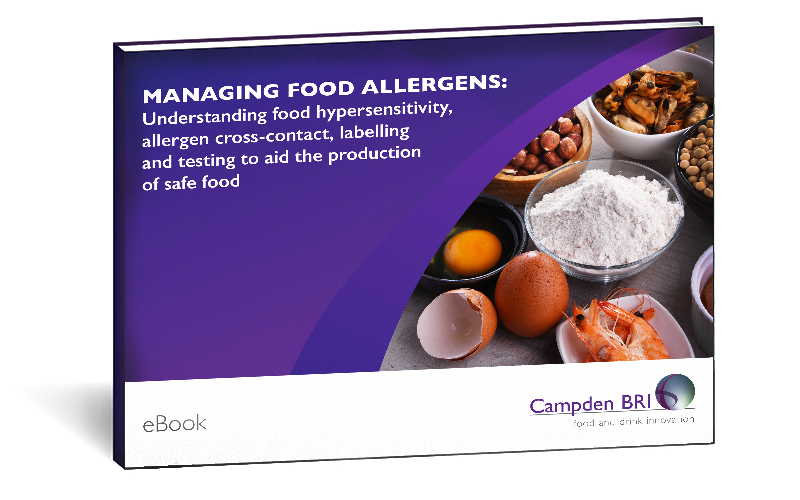
The allergenicity of edible algae – implications for food business operators
30 September 2024 | Christopher James, Safety and Quality Specialist – Allergens
There are 14 substances or products causing allergies or intolerances that Annex II to the FIC (EU and assimilated UK legislation) states must be emphasised in the ingredients list on the label of prepacked food and drink. However, people can be allergic to many more than these. The prevalence varies across the world (as does the list of allergens that must be declared in food information for consumers), but work by the FAO/WHO Expert Consultation on Risk Assessment of Food Allergens suggests that – both globally and regionally – we may need to reconsider priority allergen lists.
There is also research that shows additional emerging food allergens that may need to be considered, either due to evidence of growing prevalence and high severity (in the case of kiwifruit allergy) or the growing use of a particular food that has not previously been widely consumed until recently (edible algae).
Download our FREE Managing Food Allergens eBook today! Secure food safety, control and confidence through effective allergen management

This blog presents research into the allergenicity of edible macro- and micro-algae, as well as what food business operators (FBOs) need to do to protect their businesses, products and consumers from risks associated with emerging food allergens.
Research into the allergenicity of edible algae
The use of seaweed and algal derived products in the food industry has grown rapidly in recent times. Major areas of expansion have been in Western countries where algal derived commodities are being used as edible foods or sources of high value ingredients. However, studies focused on potential allergenicity attributed to these food items, prevalence of allergenicity, and public health awareness are limited.
This research therefore summarises the existing literature focused on algal induced food allergy in humans.
The key findings were as follows:
- Most research focused on prevalence and was derived from studies conducted in Europe (58%), North America and Canada (33%), and the remainder Australia and South Korea (9%).
- Several components have been characterised as able to induce allergic responses in humans.
- Most research focused on microalgal species, notably, Spirulina and Chlorella (58%).
- Studies associated with allergic responses to macroalgae considered red algae, Chondrus crispus and Palmaria palmata, as well as the algal derived component carrageenan, isolated from a number of sources including Chondrus crispus, Eucheuma and Gigartina seaweeds, respectively.
- Common symptoms associated with edible algae allergenicity included oedema (33%), gastrointestinal symptoms (25%), urticaria or erythematous (rash) (42%), anaphylaxis (42%, 5 of 12 studies).
The available evidence identified points to algal derived products as being potential sources of allergens in the human food chain. Algal products themselves have been reported to have inherent allergenicity as well as acting as a vector of adventitious food allergen cross-contact of seafood allergens.
Few studies have assessed the prevalence of algal allergenicity in the general population and as such further research is warranted given the increased usage of these products in the food industry.
The full research paper can be found in the Journal of Applied Phycology.
What this means for food business operators now
FBOs need to be aware of edible algae as a potential source of food allergens in their food chains. Both from the point of view of their ability to cause allergic reactions themselves, but also with respect to their risks as vectors of seafood allergen cross-contact.
In the face of risks from current and emerging food allergens, FBOs need to look at their food chains not just with respect to allergens listed in relevant legislation, but also for risks relating to emerging food allergens such as edible algae, kiwifruit, legumes, insects and more.
For all ingredients, there needs to be an understanding of where they are from, what is in them (including potential cross-contact with current and emerging allergens) and who could potentially have a reaction to them.
When using new ingredients, FBOs need to understand the composition and food allergen cross-contact risks – not just with respect to the allergens regulated in their market of production and sale, but also with respect to considerations around the impact of emerging food allergens.
How we can help
Dealing with food allergens can be challenging – but our teams are here to help. We have over 100 years of expertise and are well-equipped to support food and drink businesses in all areas of food allergen management.
Our experts can support with:
- review of food chains, risk assessments of ingredients / formulations (and providing objective feedback);
- provision of food allergen / risk information about a new ingredient that an FBO is considering, and;
- investigation and root cause analysis of complaints relating to food allergens in products.
By working with us, you can make the most of our extensive offerings — whether that be support to your business, consultancy, legislative interpretation, research and development, or testing and training — to boost your level of control and confidence in producing safe food.
We offer a range of services to support your food allergen management needs, including; allergen training courses, testing, and practical support with cleaning validation, hygienic design, food safety management systems, and labelling and legislation.
For more information, please contact:
Food allergen labelling and other legislation issues:
Food allergen management:
Managing Food Allergens eBook
Download our FREE Managing Food Allergens eBook today! Secure food safety, control and confidence through effective allergen management.







